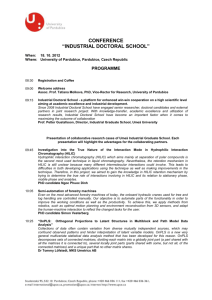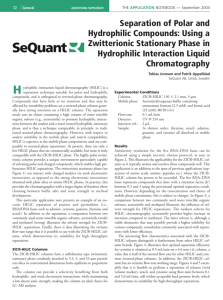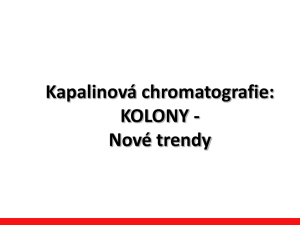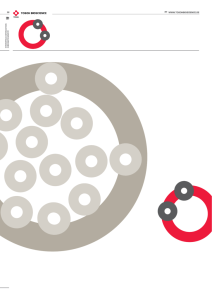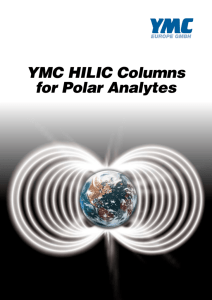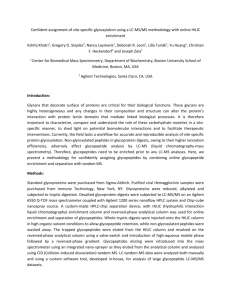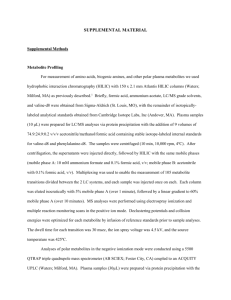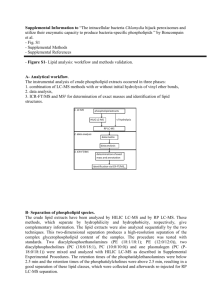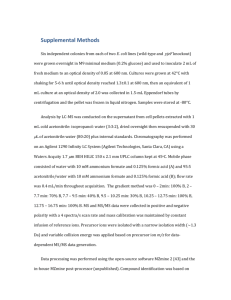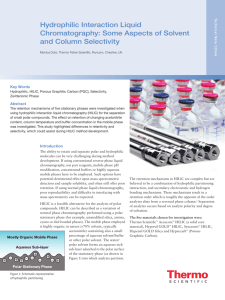Alternate Selectivity for Polar Compounds in Hydrophilic Interaction
advertisement
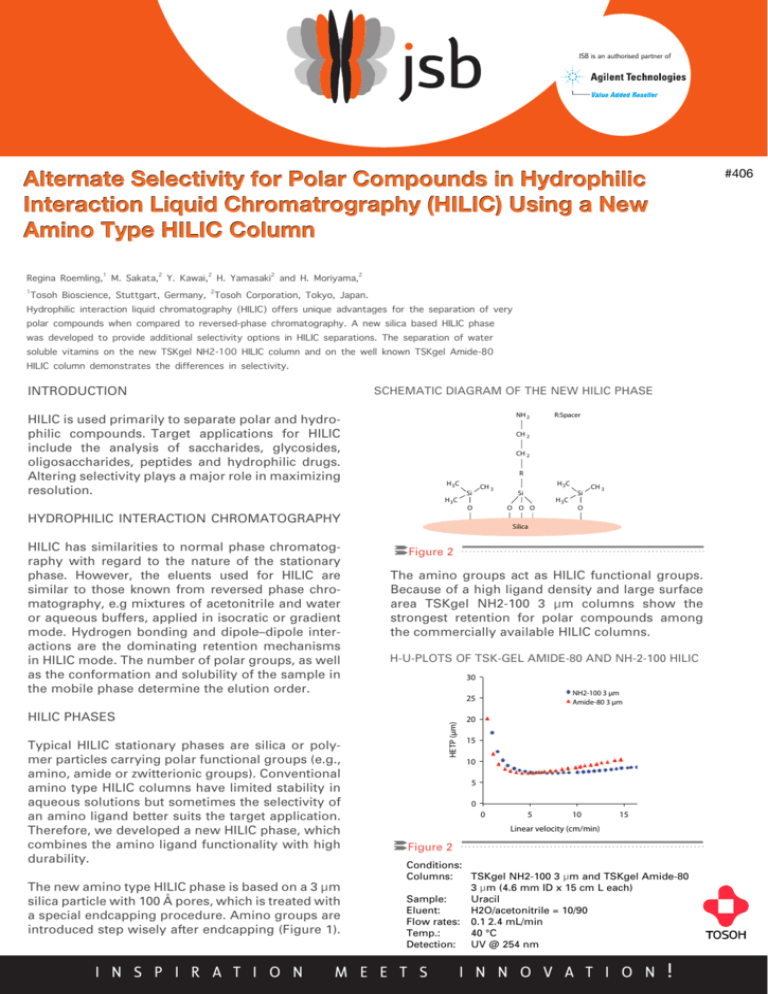
JSB is an authorised partner of Alternate Selectivity for Polar Compounds in Hydrophilic Interaction Liquid Chromatrography (HILIC) Using a New Amino Type HILIC Column Regina Roemling,1 M. Sakata,2 Y. Kawai,2 H. Yamasaki2 and H. Moriyama,2 1 Tosoh Bioscience, Stuttgart, Germany, 2Tosoh Corporation, Tokyo, Japan. Hydrophilic interaction liquid chromatography (HILIC) offers unique advantages for the separation of very polar compounds when compared to reversed-phase chromatography. A new silica based HILIC phase was developed to provide additional selectivity options in HILIC separations. The separation of water soluble vitamins on the new TSKgel NH2-100 HILIC column and on the well known TSKgel Amide-80 HILIC column demonstrates the differences in selectivity. INTRODUCTION SCHEMATIC DIAGRAM OF THE NEW HILIC PHASE HILIC is used primarily to separate polar and hydrophilic compounds. Target applications for HILIC include the analysis of saccharides, glycosides, oligosaccharides, peptides and hydrophilic drugs. Altering selectivity plays a major role in maximizing resolution. NH 2 CH 2 CH 2 R H 3C H 3C HYDROPHILIC INTERACTION CHROMATOGRAPHY HILIC PHASES Typical HILIC stationary phases are silica or polymer particles carrying polar functional groups (e.g., amino, amide or zwitterionic groups). Conventional amino type HILIC columns have limited stability in aqueous solutions but sometimes the selectivity of an amino ligand better suits the target application. Therefore, we developed a new HILIC phase, which combines the amino ligand functionality with high durability. The new amino type HILIC phase is based on a 3 µm silica particle with 100 Å pores, which is treated with a special endcapping procedure. Amino groups are introduced step wisely after endcapping (Figure 1). Si CH 3 O H 3C Si O O O H 3C Si CH 3 O Silica Figure 2 The amino groups act as HILIC functional groups. Because of a high ligand density and large surface area TSKgel NH2-100 3 µm columns show the strongest retention for polar compounds among the commercially available HILIC columns. H-U-PLOTS OF TSK-GEL AMIDE-80 AND NH-2-100 HILIC 30 NH2-100 3 µm Amide-80 3 µm 25 HETP (µm) HILIC has similarities to normal phase chromatography with regard to the nature of the stationary phase. However, the eluents used for HILIC are similar to those known from reversed phase chromatography, e.g mixtures of acetonitrile and water or aqueous buffers, applied in isocratic or gradient mode. Hydrogen bonding and dipole–dipole interactions are the dominating retention mechanisms in HILIC mode. The number of polar groups, as well as the conformation and solubility of the sample in the mobile phase determine the elution order. R:Spacer 20 15 10 5 0 0 5 10 15 Linear velocity (cm/min) Figure 2 Conditions: Columns: TSKgel NH2-100 3 µm and TSKgel Amide-80 3 µm (4.6 mm ID x 15 cm L each) Sample: Uracil Eluent: H2O/acetonitrile = 10/90 Flow rates: 0.1∼2.4 mL/min Temp.: 40 °C Detection: UV @ 254 nm m e e t s i n n o v a t i o n ! i n s p i r a t i o n #406 Figure 2 shows the H-u plots of the TSKgel Amide-80 and NH2-100 HILIC phases. The optimum HETP for the amino type column is reached at a flow-rate of 1.2 mL/ min at a pressure of 6 MPa. At increased flow-rates the H-u-curve is relatively flat. This allows using this column for fast separations at elevated flow rates without impairing separation efficiency. The availability of two TSK-GEL HILIC phases offering different selectivity features allows for adopting both, the stationary as well as the mobile phase to optimize the separation of a given sample. Available in a particle size of 3 µm, both columns are ideally suited for high efficiency HPLC as well as HPLC–MS analysis SEPARATION OF WATER SOLBLE VITAMINS MATERIAL AND METHODS Columns: TSKgel NH2-100 3 µm, 4.6 mm ID × 15 cm L TSKgel Amide-80 3 µm, 4.6 mm ID × 15 cm L Mobile phase: 25 mM phosphate buffer (pH 2.5)/ACN=30/70 Flow rate: 1 mL/min Temp.: 40 °C Detection: UV @ 254 nm Sample: Figure 3: vitamin standard mixture Figure 4: energy drink (filtrated, diluted in CAN (1:1)) Injection: 5 µL Figure 3 shows the separation of a standard solution of water soluble vitamins on a TSKgel NH2-100 column compared to the separation on a TSKgel Amide80 column. Both columns have the same dimension (4.6 mm ID × 15 cm L) and particle size (3 µm). Flow rate and mobile phase were identical as well. The elution order of the compounds varies when applying the same mobile phase to both columns: The new amino type column shows a stronger retention for nicotinic acid, vitamin C and vitamin B12 while retention of vitamin B1, B2 and pyridoxine is reduced. Figure 4 shows the analysis of a commercially available energy drink on the new amino-type HILIC column, after filtration and addition of the same volume of acetonitrile. Figure 3 Columns: Peaks: TSKgel Amide-80 and TSKgel NH2-100 1 = nicotinamide; 2 = vitamin B2; 3 = pyridoxine; 4 = nicotinic acid; 5 = vitamin C; 6 = vitamin B1; 7 = vitamin B12 HILIC ANALYSIS OF WATER SOLUBLE VITAMINS HILIC separations are performed either in isocratic mode with a high percentage of organic solvent or with gradients starting with high percentage of organic solvent and ending with a high portion of aqueous solvent, which is opposite to reversed phase. The elution order of compounds is usually inversed as well. As a result in HILIC mode polar compounds are very well separated according to increased polarity. We present the analysis of water soluble vitamins (Nicotinamide, Nicotinic acid, Pyridoxine and Vitamins B1, B2, B12 and C) as an example for the separation of polar compounds on the two available TSK-GEL HILIC phases. For difficult separations of the very polar vitamins of the B complex HILIC separation is advantageous over reversed-phase analysis, especially when combined with highly sensitive mass spectrometric detection. i n s p i r a t i o n m e e t s i n n o v a t i o n ! CONCLUSION TSKgel Amide-80 HILIC columns have been used for years for a broad range of HILIC applications. The new 3 µm TSKgel NH2-100 columns provide an additional selectivity option, when increased retention or alter nate selectivity is needed. This new bonded phase provides a powerful tool for robust method development in hydrophilic interaction liquid chromatography. ANALYSIS OF VITAMINS IN AN ENERGY DRINK Figure 4 © Headquarters With courtesy of JSB International Tramstraat 15 5611 CM Eindhoven T +31 (0) 40 251 47 53 F +31 (0) 40 251 47 58 Zoex Europe Tramstraat 15 5611 CM Eindhoven T +31 (0) 40 257 39 72 F +31 (0) 40 251 47 58 Sales and Service Netherlands Apolloweg 2B 8239 DA Lelystad T +31 (0) 320 87 00 18 F +31 (0) 320 87 00 19 Belgium Grensstraat 7 Box 3 1831 Diegem T +32 (0) 2 721 92 11 F +32 (0) 2 720 76 22 Germany Max-Planck-Strasse 4 D-47475 Kamp-Lintfort T +49 (0) 28 42 9280 799 F +49 (0) 28 42 9732 638 UK & Ireland Cedar Court, Grove Park Business Est. White Waltham, Maidenhead Berks, SL6 3LW T +44 (0) 16 288 220 48 F +44 (0) 70 394 006 78 info@go-jsb.com www.go-jsb.com i n s p i r a t i o n m e e t s i n n o v a t i o n !
